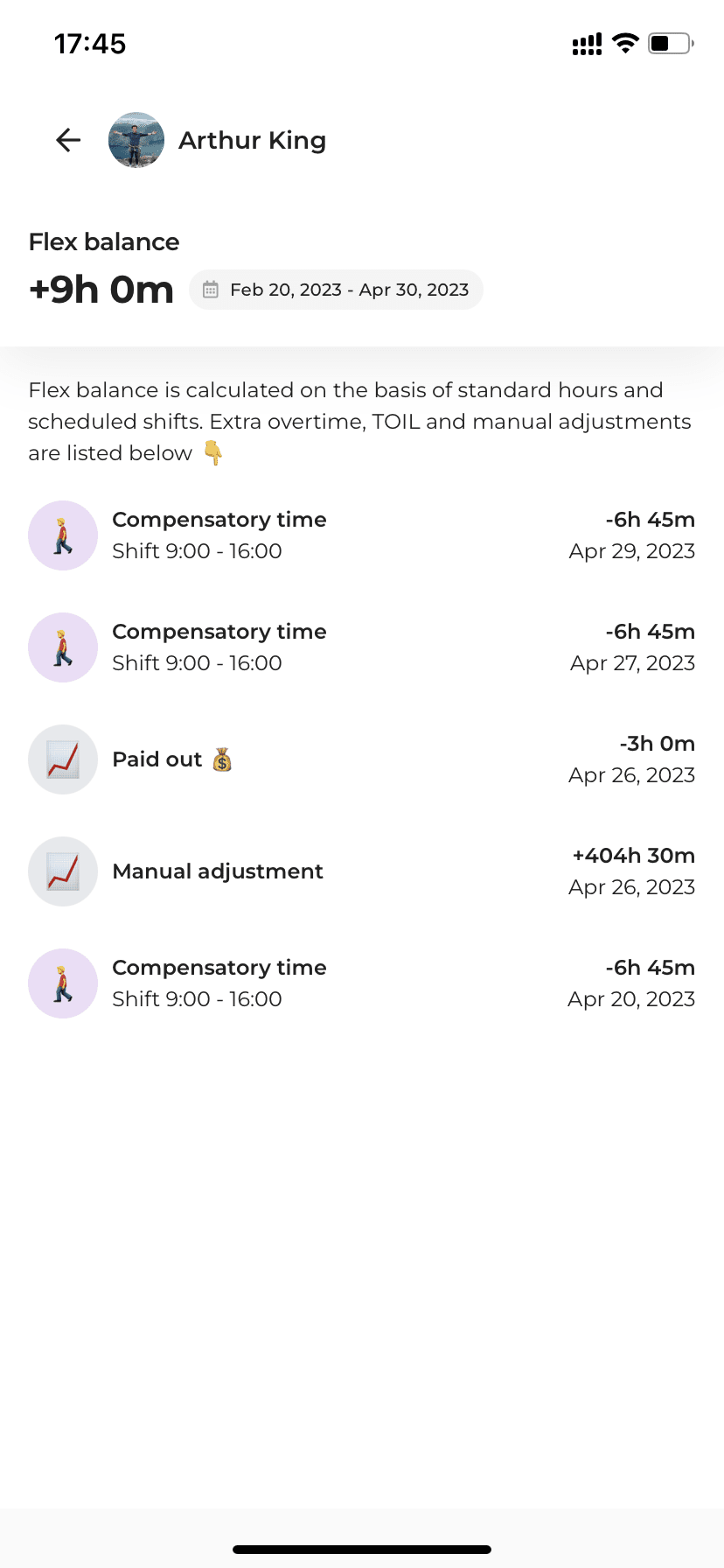
Compensatory time off is a type of employee benefit where an employee earns time off (PTO) instead of overtime pay. This means that instead of receiving extra pay for any overtime they work, they can use it as time off to use in the future. This time off is usually given at a rate of one-and-a-half (X 1.5) or two hours (X 2) off for every hour of overtime worked.
Comp time is a popular benefit among employees as it allows them to take time off from work without losing pay. It can be especially beneficial for those who have personal commitments or family obligations that require them to take time off from work.
However, it is important for employers to carefully consider the implementation of a comp time policy to ensure that it is fair and compliant with legal regulations.
Compensatory time off refers to the time off to compensate them for working extra hours beyond regular working hours. To give an example, if an employee has a standard workweek of 40 hours and works 42 hours, those 2 hours could be compensated. Essentially, it is a form of time-based compensation that is meant to provide employees with a break from their work.
Compensatory time off can be used for a variety of reasons, including personal time off, sick leave, or vacation time. Some employers may also allow employees to use comp time for professional development or training opportunities.
Comp time is earned by employees after they have worked a certain number of overtime hours. For example, if an employee works eight hours of overtime, they may earn 12 or 16 hours of comp time, depending on the rate set by the employer. The compensatory time can be used by the employee at a later time, depending to the employer's policy and approval.
Employers may have different policies regarding the maximum amount of comp time that an employee can earn. For example, an employer may limit an employee's comp time balance to 80 hours or require that it be used within a certain period of time.

Employers are required to follow certain regulations when implementing a comp time policy. The Fair Labor Standards Act (FLSA) lays out specific rules for private-sector employers, while the U.S. Office of Personnel Management (OPM) provides guidance for federal agencies.
One important requirement is that compensatory time off must be offered voluntarily and cannot be forced on an employee. Additionally, the employer must have a written agreement with the employee outlining the terms of the comp time policy.
Employers must also ensure that their comp time policy complies with all applicable state and federal laws. For example, in some states, employers may be required to pay out unused comp time at the end of the year.
Note: It is important for employers to consult with legal counsel when implementing a comp time policy to ensure that it is compliant with all applicable laws and regulations.
Compensatory time offers benefits to both employees and employers. Here are some of the advantages:
Compensatory time off is a great benefit for employees. Here are some of the advantages:
Compensatory time off is not only beneficial for employees, but also for employers. Here are some of the advantages:
Work-life balance is a critical component of an employee's well-being. Comp time can help promote this balance by allowing employees to take time off when they need it, without losing out on overtime pay. This can lead to happier, healthier, and more productive employees, which is good news for both the employees and the employer.
Overall, the benefits of comp time are clear. It offers flexibility, work-life balance, and time off for employees, while also providing cost savings, increased productivity, and improved retention for employers. By promoting work-life balance and valuing their employees' time, employers can create a positive and productive work environment that benefits everyone involved.

If you're considering implementing a comp time policy in your workplace, it's important to consider the following:
Before implementing a comp time policy, you should create a written agreement that outlines the rules and expectations. This policy should include details such as how much comp time can be earned, the rate at which it's earned, and how it can be used.
It's also important to consider any legal requirements. For example, in the United States, non-exempt employees are generally entitled to overtime pay at a rate of 1.5 times their regular rate of pay for any hours worked over 40 in a workweek.
It's essential to keep accurate records of the compensatory time off earned and used by employees. This can be done through a timekeeping system, such as an online tool or spreadsheet, or manually on paper.
Make sure that your employees understand how to track their comp time and that they're aware of any deadlines for using it.
Make sure that all employees are aware of the comp time policy and understand how it works. Provide training if needed and keep communication channels open for any questions or concerns.
It's also important to ensure that the policy is applied fairly and consistently across all employees. Avoid showing favouritism or creating situations where some employees are able to earn more comp time than others.
While compensatory time off can be a valuable employee benefit, it's not without its challenges. It's important to be aware of these potential drawbacks when considering implementing a comp time policy:
One of the biggest challenges with implementing a comp time policy is ensuring legal compliance. For example, comp time must be voluntary and employees must agree to it in writing. Failure to comply with these regulations can result in legal consequences, including fines and penalties.
Another potential challenge with compensatory time is employee misuse. Some employees may abuse the policy, using it to take excessive time off or hoarding it for future use. This can create staffing issues and disrupt business operations.
Compensatory time off can also create challenges for workload management and scheduling. If employees are taking time off during busy periods, it can be difficult to ensure that business needs are still being met.
Employers should have a plan in place to manage these challenges. This may involve cross-training employees to ensure that there are always enough staff members available, or implementing a system for requesting and approving comp time in advance to avoid scheduling conflicts.
Keeping track of comp time doesn't have to be complicated. Workfeed's workforce management system provides you with all the tools to manage your employees' schedules and hours (including OT and Comp Time).


By setting your employees' default hours and adding their work schedules, Workfeed automatically keeps track of your employees' flex balance. When your employees work overtime, this is automatically added to their balance (you can decide how these hours should be added) and when comp time occurs the hours will automatically be deducted.
Try Workfeed 14 days for free and become the boss who's in control of administration.

Copyright © 2024 Workfeed ApS